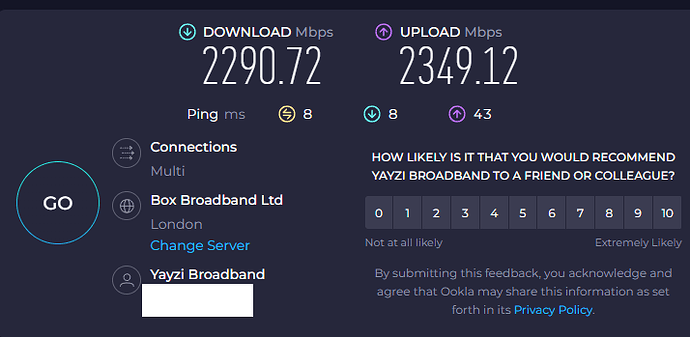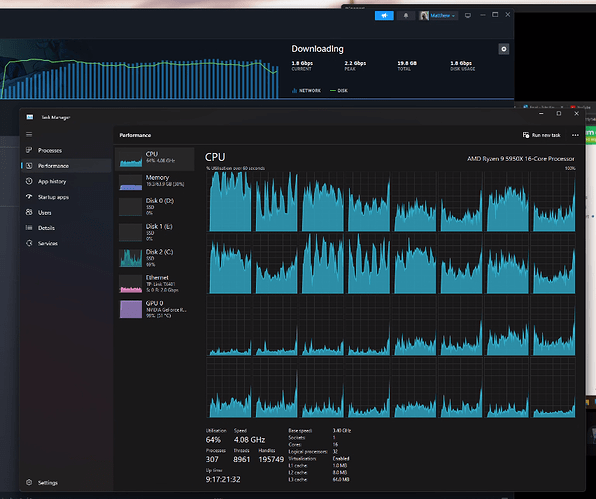To be fair, my Speedtests are generally around 1.6-1.7Gb so a possible Steam cap is inconclusive for me.
TLDR: You can only ever go as fast as Steam will let you, then as fast as the weakest link in the chain, which synthetic benchmarks aren’t always right about.
The issue here from having done some multi-gig testing on boxes with 10Gb WAN is the steam ‘end’ of things is carefully managed to provide a reasonable experience to all rather than the maximum experience to everyone. For example using news, I can rip through a download queue at my full profile speed 24/7 if I had the need and storage space on Yayzi, that’s downloading, unpacking, processing and pushing to a different storage server @ 8Gbit ish, all while also downloading and unpacking the next articles etc.
In steam’s case you’re pulling data as fast as it will let you, writing it, reading it and then unpacking it to write again, then checking it, all while still pulling the next piece and unpacking that. I’ve not looked at if it’s making extensive use of RAM for cache before writing, either way, it’s not a straight ‘benchmark number says x’ calculation. Also as pointed out NVMe tends to employ dynamic cache whereby TLC/QLC drives will dynamically allocate ‘upto’ xxxGB as SLC for fast writes, once this SLC buffer is full, it grinds as it’s got to write direct to the TLC/QLC which is slower and in the case of QLC, often painfully slow. The dynamic part is based on the % full a drive is and the buffer gets smaller the higher that % is, it’s then cleared in the background. For general desktop use that works, for dumping 80GB+ to a small drive that’s 50% full, that’s a hard no, especially it that’s written, read, processed and written again as above.
If we ignore Steam for a moment, I have the same issue writing above 8Gb/s between local servers, the links are good to 10Gb either way, synthetic benchmarks are high 9’s, lots of NVMe/RAM on either end, but between the protocol and FS overhead and the amount of CPU required to drive the data at 10Gb, i’d need to upgrade both ends significantly and still wouldn’t see much of an improvement, after that it’s protocol tuning or finding network cards with better hardware offload OS support, that then leaves the FS layer, which can be the biggest issue, it’s a rabbit hole I don’t feel the need to go down for the sake of a few minutes a day, especially when in my case WAN is ‘only’ 1.2Gb/s
Imho Steam servers are capping the speed.
They can’t be. Plenty of posts on reddit of people in the UK getting much faster speeds.
My buddy in London gets over 2.3Gbps. Though he is on 3Gbps internet.
Speetest is able to reach higher speeds because it runs a test across multiple servers. On a single server it also struggles.
This however is interesting, i find the opposite. If i let it choose multiple servers automatically, i get nowhere near the speeds i should do.
If i manually pick a single server, it’s fine.
I wonder if it’s peering related maybe?
Also to point out, Task Manager shows your ethernt at 2.3Gbps. Your steam shows disk usage at 2.2Gbps. I wonder if there is an element of maybe steam being inaccurate at showing download speeds etc? Even your task manager shows 244MB/s which is about 2.2Gbps.
This ^^^^
I might be wrong, but I think steam during the download process not only downloads the files but is also decompressing them and installing in some stages. That’s why I wouldn’t focus on the hard drive usage as a measure of speed (but only to see if it’s a potential bottleneck).
Oh yeah, sure, agreed. My point was more Steam and Task manager agree on disk usage. They disagree on Ethernet, but Task Manager seems more plausible. That was my logic, though it could easily be flawed.
Steam doesn’t install anything, that’s done after download. Though you are right, it is decompressing it etc.
Purely for those who are interested. My mate in London ran a test.
2.2Gbps download. Same CPU as me (5950x), similiar M.2 drive (pcie 4.0, same write speed), 3Gbps internet connection.
At this point, i’m starting to become suspucious that Yayzi are doing something. Or maybe it could be peering, i imagine CommunityFibre may want to peer directly to steam. Or maybe it’s because Yayzi’s existing peering (in LINX LON1, LON2 etc) is only 10GB, Unlike most other ISPs at 100GB or more (CommunityFibre, VM, Sky, BT, etc). Valve’s peering is at 400GB, so other ISP are deffo getting more throughput than Yayzi.
@Yayzi_Team @Yayzi_Staff any chance we can request peering? If so, steam please!! ![]()
That’s very interesting then. Hopefully it is just a peering issue and can be sorted.
I do notice he’s also using his GPU for decompression as that’s at 100%, others seem to only be using the CPU ![]()
It’s possible the speed would be much faster with GPU decompression.
How would he set it so that it uses gpu instead of cpu?
It looks like I am severely wrong, no such thing as GPU decompression in steam from googiling it, educated guess ![]() . He may have just been running a GPU task elsewhere
. He may have just been running a GPU task elsewhere
Gut feeling I knew hardware wasn’t the bottleneck.
Unfortunately it isn’t a case of i don’t care so it doesn’t matter. I don’t care either, but would expect users to be able saturate their bandwidth on steam downloads - hardware permitting.
Findings like this travel far and wide and for potential new customers looking to switch to CF / a new ISP it may put them off. Ultimately, it’s lost custom for Yayzi and I suspect this thread will gather traction.
I do agree that seeing 2.3gb/s download on Steam with Yayzi would be nice, if completely unnecessary
I don’t think yayzi will want to increase their peering rate for the sake of a few customers. It would be interesting to see if anyone on a OR 1.8gb/s package gets full speed
CF is still beating the snot out of OR in terms of capability - I mean, GPON can do symmetrical speed, up to 1gb, yet OR don’t offer that, so they’re not even using GPON?
Which bit did i specifically say YOU didn’t care. You were generalising customers that don’t care. I said i don’t care either, so please enlighten.
Ultimately, its not for you to decide what is and isn’t fair for paying customers. People signed up for 2GB+ internet download. Regardless of where that comes from.
You could have someone on the network that is downloading terabytes of data a day but not using steam. Is that not fair? Where is the line drawn?
Oof, 1mbps… you need to get that looked at ![]()
I can’t even use my full bandwith… because I need to upgrade my router and switch and get a 2.5gb ethernet pcie card for my PC
For reference, this is some guy on a 10G line, downloading at 5gbps
600MB/s Steam download over 10Gbps Sonic fiber link (youtube.com)
A day?
Terabytes over 1mbps in a a day?
Refer back to my previous point. You can saturate the bandwidth for aslong as you like outside of just steam. So where is the line drawn? I’d love to know.
I couldn’t give two toots what the limitation of downloading on steam over Yayzi is, but the original point of “why users downloading on steam should be allowed to “nick” all the bandwidth” is null and void. We could go round and round in circles so i’ll leave it here.
But I expect this thread will continue to grow.
For people saying it’s not fair for users. I pay for 2.3gb so i expect to be able to download one game on steam when my son wants to buy one. Otherwise everyone might as well just downgrade to a lower package as no point in having the bigger one.
For people saying it’s not fair and then downloading TBs themselves is not fair at all.

